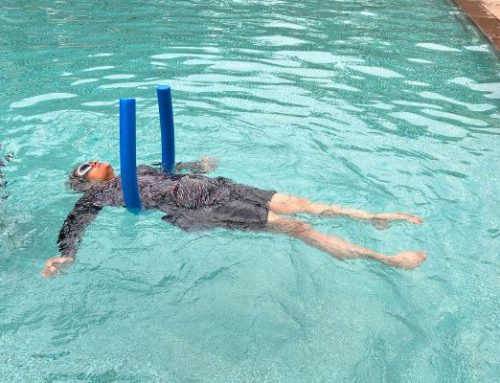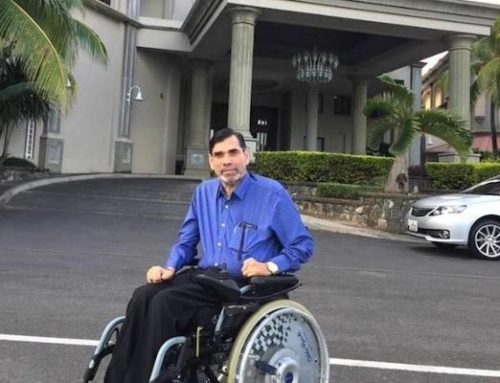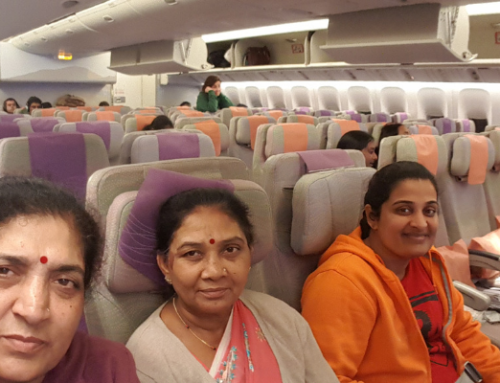“Getting back to work”
I don’t have any memory of the road accident that gave me a spinal cord injury. The only thing I remember about that morning, from 4 yrs ago, is that we were traveling from Nagpur to Mumbai and I was working in the car on my laptop.
After the spinal injury, I was dependent on others for almost everything. Brushing my teeth, getting up from the bed, cleaning my nose, drinking water and an endless list of day-to-day activities became impossible without someone helping me out. It was difficult to imagine how I could get back to work.

Pic credit: JD Hancock – CC
Using tech to overcome challenges
Gradually my body became stronger and I could sit for longer durations. ISIC has an assistive technology department and they gave me a splint which I could put on my wrist and operate a laptop with the right index finger. Now I’m able to manage without it as well. My work involves a lot of writing; emails, press releases, articles etc. I happened to meet someone who’s son was also a quadriplegic and she told me about dictation software. Today I swear by its magic of a being able to type out everything I speak, including smileys 🙂
We are privileged to live in times when there is the internet, it opens up a world of possibilities for working and many aspects of life. I have specially mentioned the topic of internet because for many it could be a part of daily life, but there are many more who don’t realize its benefits. An example, for the older generation around me, it was difficult to imagine that work can also happen without going to a physical office, over the internet. Also, Touch-screens have made it easier for people like me to use devices. Talking about tech, I must mention the freedom a motorized wheelchair has provided me. If one is not able to self-propel the wheelchair then it adds on to one of those things you are dependent on others for.
Listening to doubts and keeping inspiration close by
While some technicalities can be taken care of with the use of tech and some with the passage of time, there are some matters of the mind which need to be addressed when getting back to work.
Although I started working three months after the accident, I was not able to put in the same efforts like I used to. I would compare myself to the previous me and felt that I was not doing enough. I would always wonder what will my office think about it. I am extremely thankful that my colleagues showed a lot of patience and did not question my intention to work. But I would doubt that what do others think of me? Will I lose my job or will they think that I am less competent?
I am blessed with wonderful friends and some new people who found their way in my life in the recent years – they always inspire and remind me to think positive. They introduced me to books and philosophies about the mind and how thinking differently can impact our lives. But frankly, it is very difficult to stay positive all the time. When you are sad you don’t even remember to think about all the good thoughts.
So, one of the first things I did to fight my self-doubts is to put up a post-it note in front of my desk “If you don’t believe in yourself, nobody else will”. It helped me to feel confident whenever I had a doubt about myself. I even went to the extreme of getting a big tattoo on my forearm that says “You are what you think you are”. The point here is that – after you find your inspiration – figure out a way to make it accessible. How can you keep it close to you?
Finding a mountain to scale
Working gives me immense satisfaction. It is the only thing I can do by myself 100%. I cannot get ready by myself, but I am completely capable of preparing my company’s global CEO to do a Bollywood dance in a shopping mall in Gurgaon – to make an announcement.

Pic credit: Afghanistan Matters – CC
I do not say that I have figured out the purpose of my life, I have no clue — but I challenge myself for higher goals at work. They can be for 3 months, 6 months etc. For example, my work involves meeting a lot of people. My first doubt was what will they think about meeting a person on a wheelchair? I am supposed to demo our new mobile application but I cannot use my hands and fingers confidently. I replaced the previous post it with “Do what you are afraid to do”. I set up meetings for myself in New Delhi, Bangalore and Mumbai to meet with journalists and show them a new browser from Opera. Sometimes my cousin helped in doing the demo and I would talk about it, sometimes even the journalist did not mind taking the demo themselves by following my instructions.
The point of being, after the initial few months people stop asking you about “How is your health”, “Don’t take too much stress” — but over time they accept the situation that you are what you are and get on with work. For new people, they don’t know if you have accepted or not accepted – whether you think good or bad about yourself — they just see that you are behaving normally and they behave alike. And that’s how you build confidence brick by brick, by setting eyes on smaller goals and achieving them.
Setting up a larger purpose
Before things like ‘global peace’ and ‘eliminating poverty’ pop up in your mind, let me make it clear that I meant finding a purpose beyond yourself. Thinking beyond ‘What will happen to me after 10 years?’ or ‘When will I walk?’ helps in keeping the mind occupied with the present and stay happy.
Last week, Dr. Divya Parashar, Clinical & Rehabilitation Psychologist at the Indian Spinal Injuries Centre gave me an opportunity to speak at a workshop on enhancing the quality of life after SCI. I met up with many people with SCI and got a sneak peek into what they’re doing today. Some were working in a company, some have set up their own business, some were working on increasing accessibility for wheelchair users, some were building communities of fellow SCI people to form a support group and some had taken up the mantle of imparting their own experience in rehabilitating others injured. The one common theme across each of them is that they took up a purpose beyond themselves. At present, my work at Opera does that for me. I start my day by thinking what can be done to make sure that more people in the country know about Opera Mini. This gives me a reason to be enthusiastic about each day and gives me a purpose beyond myself.
Rehabilitation of a person with spinal cord injury starts as soon as they are out of the hospital. Months and years are spent in learning life skills, which sometimes could be as basic as bowel and bladder management. I still exercise daily to make sure all my joints and limbs get adequate movement. But life cannot only revolve around getting better at one aspect of life. The mind needs positive reinforcement all the time and I feel that getting back to work is a good source for that. It drives me to go on and I’m sure many people like me would say the same.





you are awesome
Thank you for your kind words Vibhin 🙂
I m really inspired by your story, thanks for sharing it. I m a mom of 10 years old kid with quadriplegic cerebral palsy..he is dependent on me for everything..he cannot speak too much but able to communicate everything thru gestures, I was very low after meeting an ortho as he said because my son is already reaching 10 so his brainwork grow much to learn things everyday so I should not ask him to do efforts much..although my son is very active and ambitious..he thinks a lot and dreams a lot. U can check about him at my fb account
Hi Poorna,
Thanks for writing in. I saw your photographs on Facebook. As you have said, your son thinks and dreams a lot – you already have a great sign of hope with you. It is the job of doctors/ orthos to not give you a rosy picture, even they can’t guarantee anything. The best chance of growth and improvement is that you keep trying and motivate your son also do the same. I wish you lots of love and strength 🙂
Being in Delhi, I hope you are making most of the opportunity to interact with parents in similar situations.
You are soooper awesome Mrun. I still remember the day very fresh when I heard from friends about the accident. You have always been in the prayers for a speedy recovery and woah, its so awesome and inspiring to read this post today. Kudos to you!
Thank you Vijay 🙂
Wow Mrunmaiy, I had no idea you have been through so much! The last time I met you, was in 2006 and then to suddenly see you in a wheelchair on FB and now reading this, You have truly come a long way and I salute your courage. My Best wishes to you and may you continue your journey with the same grit, determination and resolute courage you have shown till now. Go girl!
Thanks Akalpita 🙂
[…] read: Getting back to work after a spinal cord injury inspired by my talk at the Indian Spinal Injuries […]